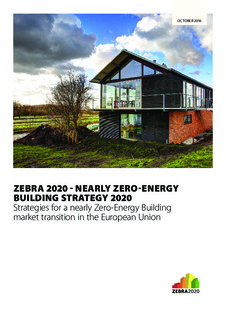| dc.description.abstract | European legislation makes nearly Zero-Energy Buildings (nZEBs) a standard by 2020. The technology is available and proven; however, the large-scale uptake of nZEB construction and renovation remains a challenge. ZEBRA2020 monitored the market uptake of nZEBs across Europe and provided data and knowledge on how to reach the nZEB standard. This information was structured and analysed to derive recommendations. ZEBRA2020 covers 17 European countries and almost 90% of the EU/EEA building stock and population.
The online data tools provide unique information regarding nZEB market development and nZEB characteristics. New approaches have been developed in order to allow for a better comparability of national data. However, the absence or difficult accessibility to key data and in particular for non-residential and existing buildings as well as for renovations remains an important obstacle.
The online nZEB tracker, based on a set of criteria, assesses the nZEB market maturity. On EU-level, the tracker shows a substantial gap of market maturity that still has to be closed by 2019/2021. A set of barriers and related recommendations have been identified both at national and EU level:
The implementation of a common, shared long-term vision for the building stock is crucial.
A quantitative comparison of national nZEB definitions is complex due to different system boundaries, calculation methodologies, applied factors etc. However, our analysis indicates that a significant share of nZEB definitions does not meet the intention of the EU directive on energy efficient buildings (EPBD) that the energy consumption should be “nearly zero or very low amount” and the remaining part “should be covered to a very significant extent by energy from renewable sources”. Thus, the new EPBD requires clear definitions of these terms and thresholds. Further, it is important to distinguish between new buildings and renovations – despite of a common nZEB definition for both cases.
The nZEB compliance monitoring and sanctions regimes need improvement. Only about half of the covered Member States monitor the compliance of new buildings with energy performance requirements.
The lack of professional skills continues to be an important barrier and should remain a focus, especially in case of new built.
In many Member States, the reliability and credibility of Energy Performance Certificates (EPC) is often questioned by actors on the real estate market. Transforming EPCs into Building Certificates (“Passes”) for the whole lifetime of a building may increase credibility and serve as a key measure to foster building renovation towards an nZEB standard. Storage of building data in an electronically accessible national database may contribute to better data availability.
Energy poverty and vulnerable consumers are a European-wide issue and need further attention. Shifting from fuel subsidy to energy efficiency support is required.
Future-proof buildings will be highly-efficient micro energy-hubs consuming, producing, storing and supplying energy. A revised nZEB definition should be future-proofed to be a smart building and district-ready. | |
